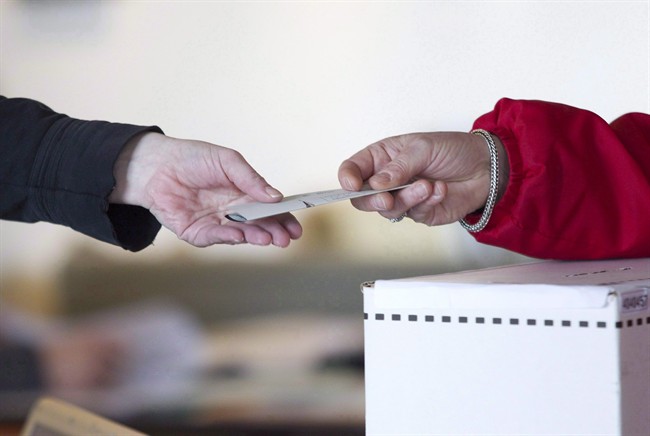Bob Mackin is a Vancouver multimedia journalist who covers news, politics, business and sports for a variety of outlets. He is the author of Red Mittens & Red Ink: The Vancouver Olympics, an e-book about the 2010 Winter Games.

The Coquitlam man who fought the ban on publishing how east coasters voted until west coast polls close watched the numbers roll in Monday afternoon on his smart phone.
The device didn’t exist when software developer Paul Bryan was charged with violating the Canada Elections Act for publishing Newfoundland and Maritime provinces’ results on election day in 2000.
“I’m glad that the government came to the conclusion that many people thought was necessary for a functioning Internet,” Bryan said. “We didn’t have social networks back then.”
READ MORE: Election 2015: Last-minute voters’ guide
Section 329 of the Canada Elections Act made it illegal to “transmit the result or purported result of the vote in an electoral district to the public in another electoral district before the close of all of the polling stations in that other electoral district.” That was, until the Conservative government decided in 2012 to repeal the law, freeing outlets like Global BC to publish the results without delay, beginning with poll numbers in Newfoundland.
The ban dated back to 1938, during the radio age, and voting hours were standard across the country. The gag order was rooted in the belief that if Western Canadians knew how Eastern Canadians had voted, then that would influence their voting behaviour while polls were still open.
The ban was supported in the 1991 report of the Lortie Royal Commission on Electoral Reform and Party Financing, but even it acknowledged that broadcasting and telecommunications advances made the publication ban obsolete. The commission’s remedy? The 1996-adopted staggered voting schedule. The old 9 a.m. to 8 p.m. openings, regardless of time zone, were gone. The staggered system means that when the polls close in St. John’s, Newfoundland at 8:30 p.m. local time, it is 4 p.m. at the opposite end of the country in Vancouver and Victoria, where voters have until 7 p.m. to cast a ballot.
- Joffre Lakes to close for 3 periods this year under agreement with First Nations
- ‘Why aren’t we doing more?’ White Rock on edge with killer on the loose
- B.C. carjacking victim says she doesn’t trust the ‘catch-and-release’ system
- Inquest into fatal Surrey hostage-taking recommends cameras for ERT teams
On the Nov. 27, 2000 election day, Bryan published results from Newfoundland and the Maritime provinces on his blog. Elections Canada fined him $1,000. Bryan successfully argued in B.C. Supreme Court that that the Internet made the law obsolete and he claimed the ban violated his Charter-guaranteed freedom of expression and political association. A B.C. Supreme Court judge threw out the conviction in 2003, which allowed the results of the 2004 election to be spread without the ban.
IN DEPTH: Full coverage of the of the federal election across Canada
That didn’t last long. The B.C. Court of Appeal reversed the decision and upheld the law in 2005. In 2007, the Supreme Court of Canada concurred by a 5-4 verdict. The high court ruled that section 329 was a reasonable restriction on freedom of expression.
“The… ban is only operative for a matter of two to three hours, only on election day, and it is only the late voters who will be affected,” according to the decision. “While the ban may be inconvenient for the media, this argument cannot be allowed to override as important a goal as the protection of Canada’s electoral democracy.”
The court relied on expert testimony by York University political science Prof. Robert MacDermid. MacDermid said there was evidence from United States elections in 1964, 1972 and 1980 that knowledge of another region’s choice influenced voting patterns where the polls had yet to close.
“Professor MacDermid explained that according to American studies, knowing the election results from the rest of the country, especially when this knowledge is combined with a media prediction of the election’s outcome, can have an impact on voter behaviour, including lower voter turnout and strategic voting,” the decision said.
Finally, in January 2012, Democratic Reform Minister Tim Uppal Tweeted the announcement that the ban would be scrapped. Coincidentally, one of the early opponents of the ban in 2001 was the president of the National Citizens Coalition, Stephen Harper. Bryan said Harper offered more support than simply fundraising to pay court costs. Harper offered moral support and even attended Bryan’s court hearings in Vancouver.
Tonight, Canadians are finding out, in real-time, whether Harper remains Prime Minister.
“Professor MacDermid explained that according to American studies, knowing the election results from the rest of the country, especially when this knowledge is combined with a media prediction of the election’s outcome, can have an impact on voter behaviour, including lower voter turnout and strategic voting,” the decision said.
Finally, in January 2012, Democratic Reform Minister Tim Uppal Tweeted the announcement that the ban would be scrapped. Coincidentally, one of the early opponents of the ban in 2001 was the president of the National Citizens Coalition, Stephen Harper.
Tonight, Canadians will find out, in real-time, whether Harper remains Prime Minister.
You can track live election results here


Comments